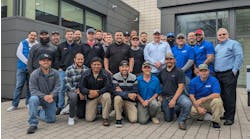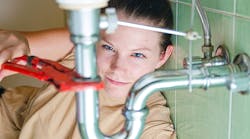Latest from Training Opportunities
Sponsored
When Lillian Ann Baumbach of Arlington, Va., became the first woman in the U.S. to hold a Master Plumbers license in 1951, all of the newspaper accounts, as a matter of course, referred to her as “pretty.” It was also noted that she corresponded with hundreds of GIs serving overseas and became a pinup girl for an infantry company in Korea. Somehow in our January print edition I managed to write an entire story about Mark Giebelhaus without once referring to his looks (although he is a dashing and dapper gentleman).
I encourage you to read the story in this issue by our Hal Conick, “Why are there still so few women in plumbing?” Hal recounts the story of Jessie Cannizzaro, who earned a BA in business administration and an MBA, before going to work for her father and getting her Master Plumbers license. Cannizzaro is in her 11th year in the field and fourth year as the owner of Milestone Plumbing Inc., Wauwatosa, Wisconsin.
“Women plumbers are hard to find,” Cannizzaro says. “I’d hire them in a heartbeat.”
The numbers show how few women are in the plumbing trade, Hal reports, as 2010 data from the U.S. Bureau of Labor Statistics found that only 1.5 percent of the 553,000 plumbers, pipelayers, pipefitters and steamfitters were women. If the scope is widened to the trades, women make up 2.5 percent of the workforce.
A report from the National Women’s Law Center said women in construction and related trades rose from 2.2 percent in 1978-1983 to 2.6 percent in 2012, while other industries, such as engineering (from 4.8 percent to 12.1 percent) and lawyers (from 13.8 to 32.6 percent) saw sizeable increases. But why are these numbers so low in the trades?
People often think it’s dirty work, Cannizzaro says, which it doesn’t have to be, or that it requires heavy lifting, which is less of a concern now that many DWVs are PVC or ABS.
Two other factors may be at work — gender stereotyping along with a lack of information about all trades.
Hal interviewed Chicago Women in Trades Executive Director Jayne Vellinga, who said a reason there are so few women in the plumbing business is because they simply never hear about it at a young age when ideas about a career are formed. Much of the hands-on work, for both boys and girls, has been cut out of the school system due to the push for everyone to go through college, but girls are rarely told about plumbing as a career option.
“Gender stereotyping begins at a very early age,” Vellinga said. “Women don’t know much about the careers or benefits of the career. It’s just not presented as an option to women, either as students or adult students looking for work.”
Kudos to the Dwyer Group, Waco, Texas, which owns the Aire Serv and Mr. Rooter franchises, and has been a leader in recruiting women into the trades. That probably has a lot to do with the company being run by Dina Dwyer-Owens. Former Marine Corps Captain Mary Kennedy Thompson is the president of Mr. Rooter.
On its website, the Dwyer Group explains its scholarship offerings and says, “If you are a woman working towards a career in the trades, a student studying for a career in the trades or a current front-line employee for a franchise location of one of The Dwyer Group brands, apply today.
“At The Dwyer Group, we envision a world where more women are utilizing their talents and abilities making a living in the household repair trades, whether working in the field or owning a franchise location of one of our seven home service businesses. This scholarship exists to support the personal growth of women as they pursue education and training in one of our seven company trades (plumbing, electrical, HVAC, restoration, landscaping, appliance repair, or glass repair and installation).”
Sometime in the near future, I would hope that we change the way we talk about gender and careers. We don’t feel obligated now to point out that a plumber is a man. Australian plumber and blogger Carlie Low refers to herself as a plumbette and I really wish she would stop it. That makes her sound “less than.” She’s a plumber.
Hey, Tweeps, I'm on Twitter @bobmader. You never know what I might say.
Robert Mader Blog | Editor in Chief
Bob Mader is the editor of CONTRACTOR magazine, Green Mechanical Contractor magazine, and Radiant Living magazine. He has been writing about plumbing, mechanical, green building and HVACR topics for more than 25 years.


